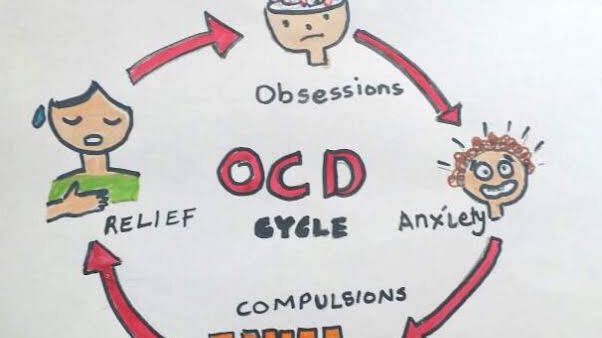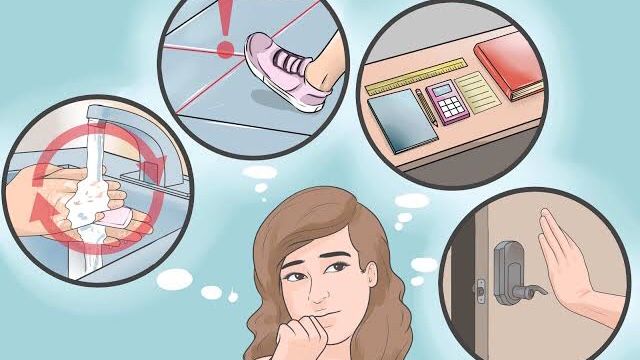Treating Ocd
Oct 18, 2019 • 49 views
In June of 2019, I did an internship at IMHANS, Srinagar. I thought it would be a productive way of using up my free summer vacation time. And I’m so thankful for this decision. During my internship, I met a number of interesting people, with incredible stories. I still remember the first day I walked into the ward and saw 30 patients on their beds. On my last day, I knew everyone’s story and it was hard not being a part of it anymore. One of them was a 60-year-old woman from Kulgam. She had had OCD for the past 30 years! Although this pointed to the lack of awareness, poor medical facilities, ineffective treatment etc, I was still amazed at how this woman had managed to live in a normal society. Now you may wonder what OCD is and why I was so amazed by this woman? Let’s find out!
Obsessive-Compulsive Disorder (OCD)

The cycle of OCD. Source: pediatriciandubai.blog
OCD is the occurrence of unwanted and intrusive thoughts or distressing images accompanied by compulsions to perform a behavior to undo or neutralize the obsessive thoughts or images as a way of preventing so thing distressful.
Obsession is the recurrent and persistent thoughts, urges or images that perceived at some time during the disturbance as intrusive and unwanted and cause anxiety and distress.
Compulsion refers to repetitive behavior or mental acts that a person feels driven to perform in response to an obsession according to rigid rules and it decreases anxiety.
For a person to be diagnosed with OCD she/he needs to fulfill the DSM-5 criteria which are:
Presence of obsession or compulsion or both.
Obsession and compulsion are time-consuming and cause functional impairment.
Not attributable to any physical condition like SAD.
Not better explained by any other mental disorder.
There is not enough statistical data present for us to deduce the exact prevalence of OCD in India. However, recent research conducted on a large sample of adolescents concluded that the prevalence is close to 0.8%. The data points out to the highest prevalence being 3%. It is most common in divorced or unemployed individuals and begins usually with early-onset.

Different Themes of OCD. Source: revitalistclinic.com
OCD actually has many types of themes. They are:
Contamination Fears
of harming oneself/others
Need for symmetry
Intrusive thoughts and Rumination
Checking
Can OCD be cured?

OCD can be treated. Source: anxiety.org
Recent developments in the medical field have rendered effective treatments or disorder. Some people can be completely cured after treatment while others notice significant relief. People suffering from OCD can live a normal happy life amidst people if they make some lifestyle changes and go for some treatment. The treatments include Psychotherapy and Medication.
Psychotherapy
Psychotherapy refers to any psychological service provided by a trained professional that primarily uses forms of communication and interaction to assess, diagnose, and treat dysfunctional emotional reactions, ways of thinking, and behavior patterns (VandenBos, 2007). it can take place in many setting including individuals, family, and groups.
Psychoeducation is an important component of psychotherapy which includes providing education about the disorders to the patients in order to validate, support and empower them. Here are some helpful measures under psychotherapy:
Support Groups
A forum for counseling where people with similar problems and goals share their experiences. Support groups for OCD are prevalent worldwide. You can find some help here.
Cognitive Behavior therapy
A talk therapy focused on modifying negative thoughts, behaviors and emotional responses associated with psychological distress.
Aversion Therapy
Suppressing unwanted behavior, like smoking, by associating it with a negative experience, like an electric shock.
Rational Emotive Behavior Therapy
Psychological treatment that helps people change negative, irrational thoughts and improve emotional well-being.
Exposure and Response Prevention
A talk therapy based on exposing feared or traumatic experiences within a safe setting in order to help reduce any associated psychological distress.
Medication
Certain psychiatric medications can help in controlling the obsessions and compulsions of OCD. Most commonly antidepressants are used. These may include, Clomipramine (Anafranil), Fluoxetine (Prozac), Fluvoxamine, Paroxetine( Paxil, Pexeva), Sertraline (Zoloft). some other common groups of medication used are:
Selective Serotonin Reuptake Inhibitor (SSRI)- Eases symptoms of depressed mood and anxiety.
Anxiolytic- Relieves anxiety and tension. May promote sleep.
Antidepressant- Prevents or relieves depression and elevates mood.
